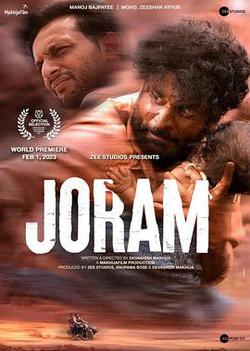
播放來源 (加載失敗卡頓請嘗試快進或切換FLV來源)手機掃碼看 / 問題回報
Joram opens with an idyllic glimpse of rural young love in Jharkhand, Eastern India, and jarringly jumps forward to gritty labourer life in Mumbai. Some years after leaving the village, Dasru and Vaano are working and sleeping at a construction site with their infant daughter, Joram, clinging to their backs. The thriller unravels through flashbacks, portraying the promise of big-city successes shattered by the realities of modernity and power. A suspicious encounter with a political leader of a tribal community, Phulo Karma, culminates in brutal violence and forces the soft-spoken Dasru to flee into Mumbai’s evening smog. Desperately navigating the city’s underbelly and exhaustively fending for Joram, Dasru is trailed by the stoic and overworked Mumbai cop, Ratnakar, who begins to understand parallels between his own life and the man he is pursuing. Filmmaker Devashish Makhija masterfully plays with cinematic convention as Dasru and Ratnakar’s adrenaline-raising journey back to Jharkhand intertwines a thriller with subtle noir and western tropes. The chasm between a displaced Dasru and the powers that be resonate beyond the prism of one man’s survival story, and outwards to the injustices suffered by those who find themselves on the wrong side of a class, race and wealth divide. Joram unapologetically examines how poverty, corruption, dispossession and grief can desperately motivate, echoing Makhija’s previous features Ajji (IFFR 2018), and Bhonsle (IFFR 2019), also starring Manoj Bajpayee in the lead role. 源自:https://iffr.com/en/iffr/2023/films/joram






